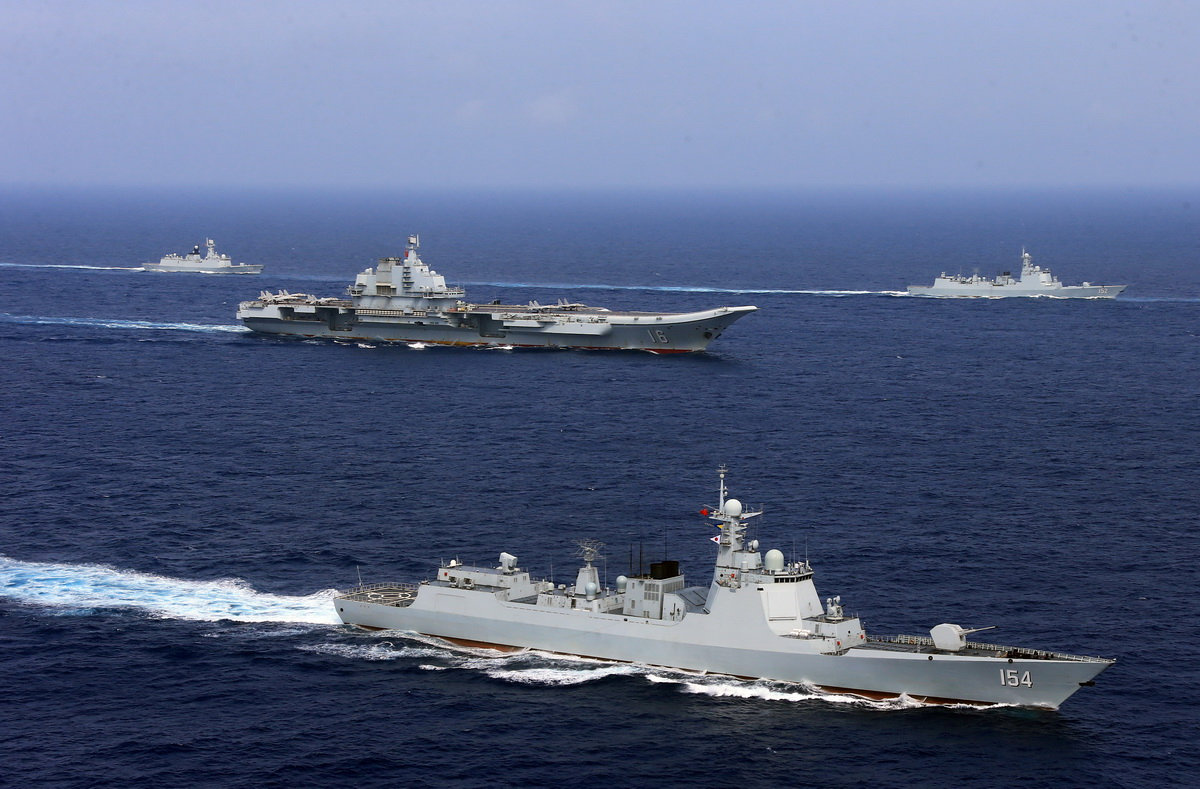Editorial Notes
China must not intimidate Taiwan: Yomiuri Shimbun
In its editorial, the paper urges China to refrain from taking measures that could heighten tensions in the region and encourages Tokyo to play its part.
Sign up now: Get insights on Asia's fast-moving developments

The Chinese aircraft carrier Liaoning (centre) and other ships from the People's Liberation Army Navy taking part in a military drill in the Western Pacific Ocean on April 18, 2018.
PHOTO: REUTERS
TOKYO (THE YOMIURI SHIMBUN/ASIA NEWS NETWORK) - Backed by its overwhelming military power, China is intensifying its moves to cow Taiwan.
China should exercise self-restraint in taking actions that will cause tension in the region.
Chinese ground forces held live-fire exercises, deploying armed helicopters and the like, off the coast of Fujian Province, which faces Taiwan across the Taiwan Straits.
Its air force has also conducted flight exercises near Taiwan, with its main bombers taking part.
The Chinese side said the military exercises were held "to safeguard the country's sovereignty and territorial integrity."
The aim of the exercises is apparently to hold in check the administration led by strongly independence-minded Taiwan President Tsai Ing-wen, as well as the U.S. administration of President Donald Trump, which supports Taiwan.
The Tsai administration has not accepted the "one China" principle, which sees Taiwan as part of China.
The Chinese administration under President Xi Jinping rejects dialogue between the relevant authorities of China and Taiwan, openly showing its confrontational posture.
On the occasion of Taiwan's first direct presidential election in 1996, China conducted missile-firing exercises off Taiwan to show its determination not to allow Taiwan's independence, and to demonstrate its military capability.
The United States dispatched two aircraft carriers, deterring China's provocation.
It should be noted that China's military capability has been dramatically strengthened from that time.
China's military spending, in officially announced figures alone, is about 15 times that of Taiwan.
While the China-Taiwan military balance has tilted in favour of the Chinese side, the United States needs to continue its engagement in Taiwan's defence.
It can be said to be an indication of U.S. support for Taiwan that the administration of U.S. President Donald Trump has given the go-ahead for U.S. companies to take part in Taiwan's plan to locally build its own submarine, a plan being pursued by the Tsai administration.
With the signature of Trump, the Taiwan Travel Act took effect in March, removing a ban on reciprocal exchanges by high-level officials of Taiwan and the United States.
The path for visits by the leaders has opened, a path from which the United States had excluded itself in consideration of China since ties between the United States and Taiwan were severed in 1979.
These steps may also be partly aimed at countering China's moves to pressure countries that have diplomatic relations with Taiwan to break off the ties, and at accelerating its maneuvers to isolate Taiwan.
China is also pressuring such international organisations as the World Health Organization to not allow Taiwan to take part as an observer.
Beijing has been increasingly resentful ever since Trump, who had not yet assumed office as the U.S. president at the time, broke with Washington custom on China and talked directly with Tsai over the phone.
At the National People's Congress in March, Xi said, "All acts and tricks to separate the country are doomed to fail and will be condemned by the people and punished by history," issuing a warning to both the Tsai administration and the U.S. government.
Xi is said to also be considering the use of force to reunite with Taiwan.
A situation must not occur in which the United States and China deepen their antagonism over Taiwan, thus having an adverse impact on the region.
The tension between China and Taiwan is also directly linked to Japan's national security. It is vital for the government to make approaches to stabilise the situation.
The Yomiuri Shimbun is a member of The Straits Times media partner Asia News Network, an alliance of 23 news media.


